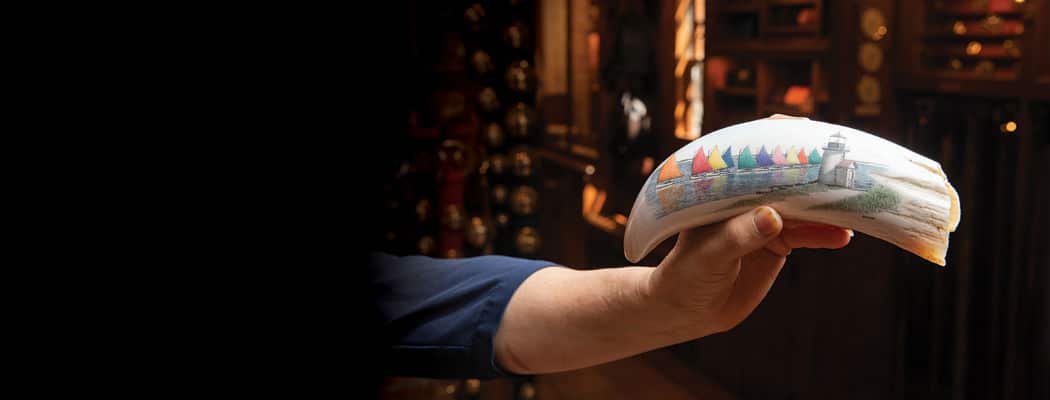Will a bill designed to save endangered species make an artistic tradition on Nantucket go extinct?
Nantucket has a long and complicated history with ivory, stretching back to the whaling days when sperm whale teeth and jawbones were used for the art of scrimshaw. Today, the Nantucket Whaling Museum houses one of the most important scrimshaw collections in the world, and the island continues to be a leading purveyor in old and newly-commissioned pieces. However, new state legislation is being pushed to curb the importation of ivory from poachers—and that might just put an end to the art of scrimshaw on Nantucket as we know it.
 This proposed legislation has been in the works for several years now. State Representative Lori Ehrlich, one of the sponsors of the bill, is trying to limit the harmful poaching and smuggling of ivory taken from endangered species such as elephants and rhinos. Just last year, 1,028 African rhinos were poached for their ivory, bringing the total number of rhinos killed in the last decade to 7,245. The State Senate has already passed the bill—which also bans the use of ivory from mastodons and woolly mammoths—and it currently sits in the House of Representatives Ways and Means Committee.
This proposed legislation has been in the works for several years now. State Representative Lori Ehrlich, one of the sponsors of the bill, is trying to limit the harmful poaching and smuggling of ivory taken from endangered species such as elephants and rhinos. Just last year, 1,028 African rhinos were poached for their ivory, bringing the total number of rhinos killed in the last decade to 7,245. The State Senate has already passed the bill—which also bans the use of ivory from mastodons and woolly mammoths—and it currently sits in the House of Representatives Ways and Means Committee.
“These protections are needed because there is a significant gray market for poached ivory that drives the killing of elephants, who are endangered,” Ehrlich contends. “Passing this bill would eliminate the loopholes in the current structure that allows the illicit trade of elephant ivory to flourish. And we are contributing to the problem: Massachusetts has been rated as a significant illegal ivory market in the US.”
One might think that poaching in Africa is a world away from Nantucket, but cases of ivory smuggling are not unheard of on the island. In 2010, a local scrimshander was convicted of smuggling elephant ivory into the country in violation of federal and international law. He was also convicted of lying to federal agents, sentenced to thirty days in jail and fined $50,000 for his crimes. Stories like these don’t come up very often, but they’ve contributed to the bad rap given to the art of scrimshaw.
While local scrimshanders are not protesting the protection of endangered species like elephants and rhinos, they still have a bone to pick with the ban—and a very old bone at that. “The included ban of fossilized mammoth and mastodon, while well meaning, has the unintended consequence of putting lawful Nantucket craftspeople out of business and will cause them to lose their livelihood,” explained State Representative Dylan Fernandes, who represents Nantucket in the Massachusetts House. “Ancient fossilized ivory has no direct connection to rhinos and elephants––animals that need and deserve robust and enforceable safeguards. Without an exemption to long-extinct animals, we feel it’s necessary to oppose the bill in its current form and protect Nantucket craftspeople.”
One of these craftspeople is Cielo Masters of Craftmasters on India Street, who has voiced concerns about what this legislation could mean for the future of her livelihood. “For us at Craftmasters of Nantucket, it would not only mean the end of our business, it would mean the end of an art style,” she says. “Many pieces of art in the form of scrimshaw would be lost.” Masters’ late husband, David Masters, was one of the most renowned scrimshaw artists on Nantucket. Cielo continues to proudly run Craftmasters in her late husband’s memory. “After David’s passing, we have continued to create scrimshaw,” she says. “And it’s not only myself as a scrimshaw artist, but all around the island there are wonderful scrimshanders that rely on the extinct woolly mammoth’s ivory to create artwork that is straight from our proud history.” She adds, “It is a beautiful art style that I do not wish to let die.”
 Addressing the concerns of scrimshanders, Representative Ehrlich has revised the bill to exempt marine mammal ivory from the ban, including whale teeth, whale bones and walrus tusks. But the scrimshanders are still fighting for old bones of woolly mammoths and mastodons.
Addressing the concerns of scrimshanders, Representative Ehrlich has revised the bill to exempt marine mammal ivory from the ban, including whale teeth, whale bones and walrus tusks. But the scrimshanders are still fighting for old bones of woolly mammoths and mastodons.
The Congressional Representative and Senators have done their due diligence in making sure that their efforts reflect the best interests of their constituents, but work remains to be done if the elephants, rhinos and whales are to be saved while keeping local scrimshanders in business. Until the political battle concludes, the question remains: Will saving endangered species have the unintended consequences of making a rich Nantucket tradition go extinct?








